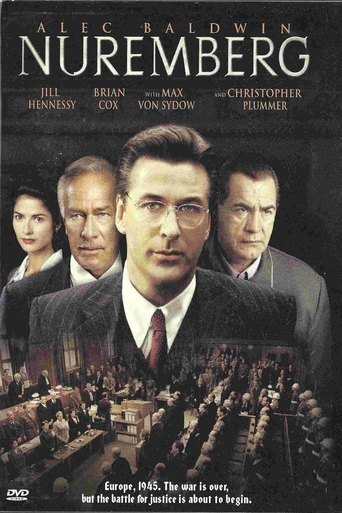


Whereas Hitler's henchmen are usually dismissed as a bunch of degenerate psychopaths, this film brought us closer to the complex mind of a prominent figure in the Nazi regime who had some degree of humanity Hermann Göring.The portrayal of Göring succeeded in bringing home one of the reasons why the German public succumbed to the Nazi regime. Göring could be a powerful & charismatic performer. Here he is using these qualities to play a game with the prosecutors whilst in custody. He presents himself as a loyal and honourable but defeated leader, maintaining his pride and self-respect in the face of the Allies' contemptuous treatment of him. He uses his charisma to bolster the others on trial and to attempt to make a mockery of it. You almost think he might succeed.Brian Cox does his job so well that we can imagine how Göring might have gained some admiration from some quarters during the trial. Indeed, sympathy and admiration are later personalised in the form of an American guard who befriends Göring. Of course, his charisma doesn't work in the end, when we later see him caught out by the prosecutor in witness box. We also see his so called "honour" disappear.But one cannot fail to moved by the scene where his wife & daughters visit him in prison, and just before she leaves asks him if she can take some of the prison food. It's pathetic to see a once powerful and still proud leader now look around helplessly, totally powerless to help his family with this basic need. Despite Göring's imprisonment and impending doom, his wife seemed unable to comprehend or accept what was happening, and still looked upon him as a figure of authority. Thank you Brian Cox for such a superb performance!
... View MoreIn 1945, after the end of the World War II with the defeat of a ruined Germany, the Allies decide to give a fair trial to twenty-one Nazi leaders POW as an example of intolerance of the governments against hideous atrocities in war. The defendants are accused crimes of war and against humanity, and the American Chief Prosecutor Robert Jackson (Alec Baldwyn) is assigned to organize an international tribunal at Nuremberg with representatives from France, Russia and England. The prisoners under the leadership of Hitler's second-in-command Marshall Hermann Goering (Brian Cox) dispute the control in a juridical battle in the courtroom."Nuremberg" is an irregular movie about the trial of criminals of war in Nuremberg. The movie has great moments, with footages from the concentration camps; the strong performance of Brian Cox; the dialog about racism and anti-Semitism between Goering and Capt. Gustav Gilbert; and the reconstitution of the destroyed German city. However, in many moments the story recalls a soap-opera, changing the focus of the trial to melodramatic and shallow situations. Further, Alec Baldwyn has a weak performance in the role of a powerful authority. Last but not the least, the movie is very cold, and with the exception of the footages of the concentration camps, it brings no emotion to the viewer. My vote is six.Title (Brazil): "Julgamento em Nuremberg" ("Trial in Nuremberg")
... View MoreWhat to do with defeated enemies has been a question all victorious Societies have had to face. The Aztec made the humbled enemy play basketball before executing them. Romans held a big parade in Rome and later Constantanople and ritually strangled the conquered. Occasionally, the vanquished enemy was pardoned and maintained at State expense. In the middle ages, captured Knights were offered for ransom.After World War II, the US wanted to have a trial. "Uncle Joe" Stalin more practically suggested shooting those there was no further use for and keeping the few with some promise. However Stalin bowed to his allies wishes and the Neuremberg Trials began with the Russian Judges' toast 'To Law.' Alec Baldwin rendered a bravura performance as Justice Jackson the US chief prosecutor at Neurember capturing the arrogance, self-righteousness and political intrigue as well as the hubris when he cannot break REichsmarshall Hermann Goering on cross-examination. "All governments fundamentally operate the same," prisoner Goering tells the stunned Jackson.The movie stays from the actual event in giving Jackson the upper hand on a second round of cross-examination and in hanging on to the end. The real life Jackson who some bouts of melancholia during the ups and downs of the trial and who had lost the honor of appointment as US Chief Justice resigned as chief prosecutor long before the verdicts were rendered and returned to Washington.The people of the Neurenberg court were concerned with how history would see them. Will to a future generation this be seen as an attempt to impose law and order on statecraft or will it seem a bizarre form of public entertainment like the basketball game the Aztecs staged?
... View MoreLet's face it, TNT doesn't usually do that great of a job with their original movies. If you think about it, there aren't too many good made for TV movies. Nuremberg is a good made for TV original. The cast is really good, and the cast members look very much like the people they are portraying. I saw a picture that was taken during the Nuremberg trials that looked as though it could have been a shot from the movie. That's how good of a job they did with this movie.Like any other made for TV movies, there are some weak moments, but this movie has plenty of strong moments that make up for the weak ones. One of the scenes that will evoke some emotion in you is a scene where an old film is shown, showing footage taken from the death camps.The length of this movie does get kind of long, but it isn't boring or anything like that. It just requires a comfortable seat. Try to see this on TNT whenever you get a chance, it's worth it.
... View More